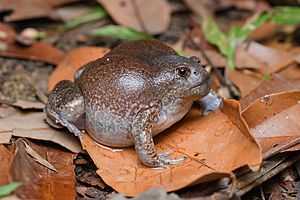Glyphoglossus molossus facts for kids
Quick facts for kids Glyphoglossus molossus |
|
|---|---|
 |
|
| Conservation status | |
| Scientific classification |
|
| Kingdom: | Animalia |
| Phylum: | Chordata |
| Class: | Amphibia |
| Order: | Anura |
| Family: | Microhylidae |
| Genus: | Glyphoglossus |
| Species: |
G. molossus
|
| Binomial name | |
| Glyphoglossus molossus Günther, 1868
|
|
| Script error: The function "autoWithCaption" does not exist. | |
Script error: No such module "Check for conflicting parameters".
The blunt-headed burrowing frog, also known as the balloon frog, is a special type of frog. Its scientific name is Glyphoglossus molossus. It belongs to a family of frogs called Microhylidae. This frog gets its common names from its rounded body shape and its habit of digging into the ground.
Contents
Where They Live and Their Homes
These frogs live in several countries in Southeast Asia. You can find them in Cambodia, Laos, Myanmar, Thailand, and Vietnam.
They like to live in warm, wet places. Their homes include tropical forests that have wet and dry seasons. They also live in grassy areas called savannas, and wet, swampy lands. Sometimes, you can even find them in gardens or temporary ponds that form after rain.
How They Reproduce
Balloon frogs are known for their quick breeding habits. When it rains a lot, temporary ponds and ditches fill with water. This is when the frogs gather to lay their eggs.
Female frogs lay their eggs in films on the water's surface. They do this in several short dips, each lasting about six seconds. In each dip, they can release 200 to 300 eggs!
The eggs are dark on one side and yellow on the other. Once the eggs hatch, the tiny tadpoles swim around. They eat by filtering small bits of food from the water.
Why They Are Threatened
Sadly, the blunt-headed burrowing frog is facing some dangers. One big threat is habitat loss. This happens when their natural homes, like forests and wetlands, are destroyed.
Another major problem is that too many of these frogs are being caught. People collect them for food, especially during their breeding season.
Balloon Frogs as Food
In some parts of Asia, especially Thailand, the balloon frog is a very popular food. It has traditionally been seen as a special dish in Thai cuisine. People say the frog's texture and taste are so good that it can be eaten whole.
However, because so many frogs have been caught, their numbers in the wild have dropped a lot. To help save them, projects are now trying to breed these frogs. The goal is to release them back into their natural homes. The first breeding project started in Phayao, Thailand, in 2009. Another one began in Lamphun in 2011.
See also
 In Spanish: Glyphoglossus molossus para niños
In Spanish: Glyphoglossus molossus para niños
 | Lonnie Johnson |
 | Granville Woods |
 | Lewis Howard Latimer |
 | James West |


